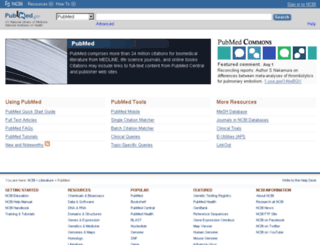Home - PubMed - NCBI
Page Load Speed
5.9 sec in total
First Response
70 ms
Resources Loaded
5.7 sec
Page Rendered
169 ms

About Website
Click here to check amazing Pub Med content for United States. Otherwise, check out these important facts you probably never knew about pubmed.org
PubMed comprises more than 25 million citations for biomedical literature from MEDLINE, life science journals, and online books. Citations may include links to full-text content from PubMed Central an...
Visit pubmed.orgKey Findings
We analyzed Pubmed.org page load time and found that the first response time was 70 ms and then it took 5.8 sec to load all DOM resources and completely render a web page. This is a poor result, as 75% of websites can load faster.